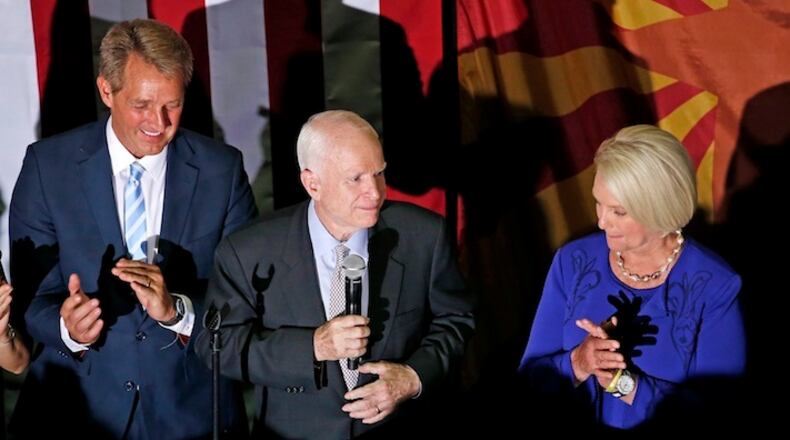WASHINGTON — The populist wave that swept Donald Trump to the top of the Republican ticket hasn't led to a revolution sweeping away party insiders.
That's the message from another set of primary victories Tuesday night for Senate incumbents from the party's establishment wing — Arizona's John McCain and Florida's Marco Rubio. It's also good news for a party hoping to cling to control of Congress even if their standard-bearer loses big in November.
Few outsider candidates have been able to replicate Trump's recipe for primary success this year, as Republicans successfully swatted away challenges to the party's incumbents. McCain's opponent, Kelli Ward, and Rubio's challenger, Carlos Beruff, each sought to ride the Trump phenomenon to no avail. Neither had Trump's name recognition, nor his ability to command media attention. They also didn't have his endorsement.
The wins come not long after Speaker Paul Ryan of Wisconsin trounced his primary challenger, Paul Nehlen, who also ran on a Trumpian message and hoped to repeat Dave Brat's shocking victory over House Majority Leader Eric Cantor of Virginia two years ago, only to score less than 16 percent of the vote.
Trump, of course, nominally endorsed Rubio, McCain and Ryan, and has made no real effort to build a movement bigger than himself. It's not clear how big his coattails would be if he did: Rep. Renee Ellmers of North Carolina, who received a rare Trump endorsement, lost her primary, partly as a result of redistricting.
The 80-year-old McCain and the 45-year-old Rubio, co-authors of a compromise immigration overhaul bill that passed the Senate in 2013, both endorsed Trump, too. But they've spent as little time as possible talking about him — or his policy platform.
Instead, they followed a strategy the party laid out a year ago to focus as much as possible on local issues and try to outperform Trump, should he win the nomination.
"Republicans have taken nothing for granted this cycle," said Greg Blair, spokesman for the National Republican Senatorial Committee. "We've known from day one that the map would be challenging and there would be few certainties about the political environment."
Some are openly campaigning on the need to keep the Senate in Republican hands, whether Trump or Hillary Clinton is in the White House next year.
"The only person in this race who will not be a rubber stamp for the executive branch in this election is me, and that is what we need in the Senate more than ever before," Rubio told his supporters at his victory speech Tuesday night.
Many of these Republican incumbents are running ahead of Trump in the polls in their states, including Rubio, McCain and Ohio's Rob Portman, denting Democrats' hopes of taking back the four seats they would need to run the Senate if they also win the White House.
Josh Holmes, former campaign manager for Majority Leader Mitch McConnell of Kentucky and president of the consulting firm Cavalry LLC, said the Trump factor is unique.
"It's not replicated anywhere at any level of government," Holmes said. No one has Trump's blend of name recognition, self-funding capability and a long-running, hit show on network television, he said.
He also acknowledged continuing fears that a Trump collapse could sink the party's chances if reliable Republican voters who won't vote for Trump stay home.
"That's the terrifying prospect for all the down-ballot folks," he said.
Martha McKenna, a Democratic strategist and former political director of the DSCC, said Republicans may pat themselves on the back after Tuesday night, but they still have a tough hand to play.
For example, she said, Democrats will be able to criticize McCain's core brand. "He's not a maverick any more because he doesn't even stand up to Donald Trump," she said.
"And Rubio's spent the better part of 18 months calling him a con man, and frankly being called 'Little Marco,' and now they are working together to try to win Florida," she added.
"We're going to see the real Trump effect in November," she said.
Democrats have been buoyed by polls suggesting that some races could be closer than expected, with Republicans like Sen. Richard Burr of North Carolina showing some vulnerability.
As for McCain, Sadie Weiner, the communications director for the DSCC, said: "It's telling that Republicans have to take a victory lap over things like the former presidential nominee of their party winning a Senate primary."
Strategists in both parties agree, however, that Republican leaders have done a better job of avoiding flameouts in the last two cycles.
Holmes said there was a change in culture at the top of the party after unsuccessful candidates, including Todd Akin in Missouri, Richard Mourdock in Indiana and Christine O'Donnell in Delaware, cost the party Senate seats in 2010 and 2012. The party avoided such disasters in 2014 on their way to a resounding victory.
"Going into 2016, the goal was to replicate that and we have," Holmes said.
Among the victories piled up by the establishment in primaries are Sen. Richard Shelby in Alabama and Rep. Todd Young in Indiana, who now faces an uphill battle against star Democratic recruit Evan Bayh in the polls.
"You can't win elections with candidates that are legitimately unqualified," Holmes said.
Holmes gives campaigns credit for avoiding getting caught up too much in the daily Trump story.
"They have done absolutely everything they can to not only compete but to outpace the top of the ballot from anywhere from 7 to 22 points, which is unheard of," Holmes said.
That said, Holmes added, "the environment is not irrelevant."
About the Author
Keep Reading
The Latest
Featured



